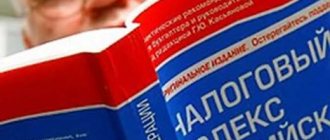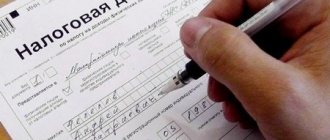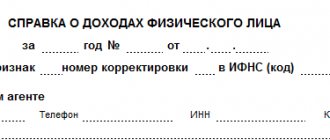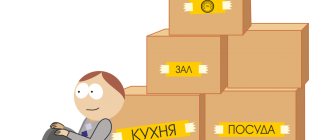Legal basis
There is no separate Federal Law on personal income tax benefits. A whole list of legislative acts regulates personal income tax benefits:
- NK (Article 217-222);
- Labor Code (Article 118);
- various letters from the Ministry of Finance, resolutions of the Government of the Russian Federation.
Russian legislation establishes two types of personal income tax benefits - tax deductions and exemptions from taxation of certain types of income. The Tax Code lists a closed list of such income:
- state benefits for unemployment, childbirth and pregnancy;
- old-age pensions (does not apply to insurance contributions of private pension funds);
- one-time and monthly payments for children;
- compensation for damage to health, dismissal, etc.;
- alimony;
- maternity capital;
- payment by the employer for the services of medical institutions to its employees.
The full list can be found in Art. 217 NK. Article 215 lists categories of foreign citizens who are also exempt from income tax.
There are several groups of tax deductions. The most common are:
- standard deductions (for yourself and for children);
- social (in a situation where a citizen incurs social costs - for study, treatment, charity);
- property (when selling, buying or constructing real estate, in other cases);
- professional (taxpayers are entrepreneurs with the status of individuals, notaries).
Regulates property tax deductions Art. 220 of the Tax Code, as well as various federal laws establishing changes in the tax code.
Article 56 of the Tax Code of the Russian Federation “Establishment and use of benefits for taxes and fees”
Article 215 of the Tax Code of the Russian Federation “Features of determining the income of certain categories of foreign citizens”
Article 217 of the Tax Code of the Russian Federation “Income not subject to taxation (exempt from taxation)”
Article 218 of the Tax Code of the Russian Federation “Standard tax deductions”
Article 219 of the Tax Code of the Russian Federation “Social tax deductions”
Article 220 of the Tax Code of the Russian Federation “Property tax deductions”
Article 221 of the Tax Code of the Russian Federation “Professional tax deductions”
Article 222 of the Tax Code of the Russian Federation “Powers of legislative (representative) bodies of the constituent entities of the Russian Federation to establish social and property deductions”
Article 118 of the Labor Code of the Russian Federation “Reimbursement of expenses when using the employee’s personal property”
Type of benefit: social
All taxpayers can receive social deductions for tax payments - this is stated in Article No. 219 of the Tax Code of the Russian Federation. It refers to income that is taxed at a 13 percent rate. An important point is that these deductions can only be obtained at the tax office at the taxpayer’s place of residence. A prerequisite will be the submission of a personal income tax return for the year in which the following expenses were incurred. That is, if you underwent treatment in 2016, the declaration must be submitted strictly in 2021.
Accordingly, the payer must provide the tax authorities with documents confirming his expenses, for example, a training agreement. There is no need to attach an application for a tax refund starting from 2010. Now let’s take a closer look at the cases in which you can count on social deductions.
Getting an education
If the payer wants to receive a refund for himself, then the form of training (full-time or part-time) does not matter. If the payment is aimed at children's education, this is only possible for full-time students.
Important point! When you need to submit a declaration is influenced not by the duration of study, but by the date of payment. If on one day a citizen pays for studies for several years in advance, documents must be submitted for one, current tax period. The submitted declaration will need to be accompanied by an agreement with a licensed educational institution and a payment document (check or other) documenting that you actually deposited the money.
The tuition deduction has limits established by law. If you paid for the education yourself, the limit will be “waiting” for you at around 120 thousand rubles; if for a child, the limit will be 50 thousand rubles for each heir. If maternity capital was used as payment for studies, the right to receive a deduction is lost.
How to get a tax deduction for education? Our special article will help you understand this. In it you will find everything about the procedure for obtaining a deduction and a list of necessary documents.
Payment for medications and treatment
In cases where a Russian citizen received paid health-related services (no matter in a public or private clinic) or bought medications, he can return part of the expenses. In this case, the deduction can be issued for yourself, minor children, spouse or parents. The list of goods and services covered by social benefits includes diagnostic and therapeutic services, disease prevention and rehabilitation, inpatient treatment and outpatient examinations. Deductions are also issued for cash contributions for voluntary health insurance policies.
Important point! In normal situations, the refund limit is one hundred and twenty thousand rubles, but if we are talking about expensive vital medical care, then expenses are accepted without restrictions. You can find a complete list of expensive treatments in our article .
Funding your pension in the future
Refunds are primarily aimed at those who incurred expenses by voluntarily (voluntarily) paying for insurance on their life, or the life of close relatives - husband or wife, one or both parents, children. People who have prepared contributions to provide themselves with a pension (but not from the state) or insurance for pensioners are entitled to receive a deduction. Secondly, such social returns can be returned to the account of money paid as additional contributions going to the labor pension, or rather, its funded part.
Charity
The state gives the right to return part of the funds that went to good deeds. We are talking about donations to religious organizations, as well as educational, cultural and other institutions. But you should understand that we are talking only about money. If a citizen independently purchased assistance in material form (furniture, appliances, clothing, etc.) to donate as charity, no return will be expected.
Limits by law
The amount of the personal income tax benefit has its own limit, which is established at the legislative level.
The limit on standard personal income tax benefits is fixed in Art. 218 NK. For social - Art. 219, property - Art. 220, professional - in Art. 221. There are two types of restrictions on the amount of tax deduction:
- fixed amount (standard);
- percentage of costs, but not more than a fixed amount (social, property, professional).
Important! All deductions are provided only to officially working citizens on income subject to 13% income tax.
In addition to the size limit, there are other restrictions - the number of payments (once a year, once in a lifetime), the object of receipt (parents, homeowner, etc.), types of expenses (medical services, purchase of housing, for children, etc.). ).
Read also: Car recycling program in 2021
What cannot be taxed?
So, what types should be immediately excluded from the tax base? It is difficult to consider this as a personal income tax benefit, since all citizens of the Russian Federation, without exception, enjoy them. This is stated in the country's Labor Code.
First of all, it is worth noting financial assistance. According to current legislation, an employee has the right to financial assistance of up to four thousand rubles, which will not be taxed at thirteen percent. It is worth considering that the calculation of the total amount is taken on a cumulative basis from the beginning of the calendar year. That is, if an employee received four thousand rubles in January in honor of the New Year, then all other financial assistance accruals will be subject to income tax.
The second point is compensation payments. For example, when staffing is reduced. This also includes the compensation that an employee receives for a medical examination upon entry to work.
Which parent can receive
Article of the Tax Code clearly states who is entitled to personal income tax benefits for children under 18 years of age:
- both parents raising the child/children (including those who are not related by blood - stepfather, stepmother);
- guardians and trustees.
The main condition for obtaining income tax deductions is the presence of official work, from which taxes are received into the state treasury.
If the parents are divorced or living separately (which can be documented), one of the parents can refuse this benefit, and the other can issue a double deduction. Double deduction is available for single parents. It will be valid until marriage.
Type of benefit: professional
The legislation distinguishes three groups of citizen-payers, whose work activities have some nuances. For them, the right to receive a professional tax deduction is set out in as much detail as possible in the Tax Code of the Russian Federation. We will briefly look at who specifically falls into these categories.
Persons conducting private practice and individual entrepreneurs
Citizens of this category receive a deduction based on documents indicating that they actually operate and receive income as individual entrepreneurs. Also, payers must document the existence of expenses related to obtaining profits from work activities. The composition of these expenses is decided by such citizens independently.
Citizens who work under agreements between individuals and legal entities
We are talking about specialists who are not hired under an employment contract and perform specific services or types of work for the customer. For this group of persons, the deduction will also be equal to “actual” expenses. In this case, expenses must be supported by documents and be related to work activities (work performed, services rendered in full).
Authors of literary and scientific works, artists, patent holders, creators of industrial designs and utility models
In this case, as in the previous one, the deduction will be equal to the amount of actual documented expenses. If it is not possible to document expenses, fixed rates are available. The following will be added to the amount of accrued income:
- 20% for authors of literary works, scientific works, performers of literary works, authors working for the stage, cinema, theater and circus;
- 25% for authors of musical works;
- 30% for video and film creators, photographers, artists and designers, architects;
- 40% will be received by decorators, sculptors, creators of music for ballets and operas, graphic designers (including graphics, easel painting), authors of works for theatrical productions, symphonies, choirs, brass bands, and citizens who wrote musical accompaniment for theatrical productions and films.
In addition to the above points, citizens belonging to these labor categories can receive a professional deduction for the state duty paid on the basis of their activities.
How to get a professional deduction?
If a citizen has an employer-agent, you need to notify him of your desire to receive a benefit - submit an application to him. If there is no agent, a written application with an attached declaration must be submitted to the inspectorate.
Payments for professionals are regulated by law.
Up to what amount of income is it allowed?
For individuals, there are restrictions on income deductions for personal income tax; they are related to the received annual income of citizens. Its size should not exceed 350 thousand rubles. On average 29-30 thousand per month.
In this case, the benefit is issued for a year. If the annual income is significantly higher, then it is valid for a month. That is, after receiving one personal income tax deduction, parents can only count on the next deduction next year. Important! Deductions are made only from the tax that is levied on the monthly salary.
Changing a job does not mean a loss of tax deduction, since it is paid by the state, not the employer. To do this, you need to take a certificate from your previous place of work.
How are taxes calculated for those who have benefits?
Each employee can independently check how the accounting department works. To do this, you need to make simple calculations of personal income tax benefits.
The employee's salary must be reduced by the amount of the deduction. So, if a single parent has one child, then he can safely deduct 2,800 rubles from his earnings. And the already obtained number is multiplied by thirteen percent.
It is also worth noting that the amounts for each child vary. If the first and second full families receive 1,400 rubles each, then the third will already bring a deduction in the amount of 3,000 rubles. So, a parent who has three children can hope that the amount of 5,800 rubles from his earnings will not be taxed. And this is 754 rubles a month, which ends up in the employee’s pocket, and does not go to the state fund.
Codes and required documentation
To fill out various documentation, all tax deductions are assigned digital codes. Examples of individual codes for personal income tax benefits are presented in the table below.
| Deduction | Recipient | Code |
| For a minor child (1,2 and 3), full-time student up to 24 years old | Any parent or adoptive parent | 126/127/128 |
| For a disabled child up to 18 years old (with groups 1 and 2 up to 24 years old) | 129 | |
| For a minor child (1,2 and 3), full-time student up to 24 years old | Guardian, foster parent or trustee | 130/131/132 |
| For a disabled child up to 18 years old (with groups 1 and 2 up to 24 years old) | 133 | |
| Double deduction for a minor child (1, 2 and 3), full-time student under 24 years of age | Single mothers, fathers, caregivers, guardians and foster parents | 134-139 |
| Double deduction for a disabled child under 18 years old (with groups 1 and 2 up to 24 years old) | Single mothers, fathers, caregivers, guardians and foster parents | 140/141 |
| Double deduction for a minor child (1, 2 and 3), full-time student under 24 years of age | For one of the parents (guardians, adoptive parents) in case of refusal to deduct the second | 142-147 |
| Double deduction for a disabled child under 18 years old (with groups 1 and 2 up to 24 years old) | For one of the parents (guardians, adoptive parents) in case of refusal of a tax deduction for the second | 148/149 |
Tax benefits: general information
A tax deduction is the amount by which the payment to the state is reduced. According to the Tax Code of the Russian Federation, there are six types of tax benefits. Today we will look at four types of such deductions: standard, property, social and professional. Two more relate to transactions with securities and investment partnerships, and can hardly be called widespread. Let's look at what the most popular benefits are in general.
Standard tax benefits are designed for military personnel, people with disabilities, as well as citizens with a child or several (this category also includes trustees, guardians and adoptive parents). Russians who are thinking about purchasing or independently building housing on a purchased plot of land should know that they are also included in the category of citizens who have the opportunity to receive a tax refund. Taxpayers can also receive social deductions for taxes subject to a 13% rate. Below we will take a closer look at what expenses fall under these benefits. And the last deduction is professional, which can be obtained by citizens with some nuances in their work activities.
Thus, citizens can reduce the amounts subject to taxes. This can be done in two ways - either return the overpayment, or not pay taxes within a certain time frame.
It is important to understand that not the entire amount of expenses incurred will be returned, but the corresponding amount of taxes paid earlier
Video - Tax deduction: who has the right to return tax
Distribution details
Tax benefits are available not only to parents of minor children, but also to other categories of citizens (veterans, disabled people, families with disabled children, etc.).
Let's look at them briefly.
To a combat veteran
This category includes not only participants of the Second World War, but also other military operations:
- Afghans;
- members of the Chechen company;
- military personnel taking part in the Syrian operation;
- other armed conflicts.
This category of Russians is not subject to tax in accordance with the changes to the Tax Code that entered into force in 2021. This happened on the basis of a decision of the Constitutional Court of the Russian Federation. Until 2021, personal income tax was withheld by employers.
Selling an apartment or land
The most famous tax preference is when an individual receives a deduction from the sale of an apartment, house or land. This benefit is called a property tax deduction. It is important for him to meet one of the conditions:
- the citizen has been the owner of the property for more than 3 years;
- the income received does not exceed 1 million rubles.
Residential premises include real estate:
- purchased before 2021;
- gifted/inherited;
- privatized;
- received from a life annuity agreement.
From 2021, the ownership period has been increased to 5 years. That is, a citizen who purchased an apartment or house after 02/01/2019, worth more than 1 million rubles, will be able to receive a tax deduction only after 5 years.
There are many nuances if the owner of the apartment is not the only one. For example, with common shared property, spouses distribute the property tax deduction independently. If the shares are defined in the agreement, then divide according to the specified parts.
Read also: Program “Young specialist in rural areas” in 2021
Help for a single mother
Single mother is the official status given to a woman who has given birth to a child/children out of wedlock.
In this case, the child has a dash in the “father” column on the birth certificate. Or information that is recorded from the words of the mother. A single father is very rare in Russia. A single parent (mother or father) has the right to receive a remote deduction for the child/children. To receive it, you will need to write a separate application attaching the child’s birth certificate, where there is a dash in the “father” column.
If the document contains information from the words of the mother, then she needs to obtain from the registry office a certificate of the birth of the child in Form 25, which is proof of the status of a single mother.
If the child
The most common tax deduction is the presence of a child/children in the family (based on birth). In addition, there are other conditions:
- official employment of at least one of the parents;
- taxable income tax at a rate of 13%;
- staying within Russia for more than 181 days a year.
The deduction is provided to parents (one of them) a month after birth. You can receive it every month or once a year.
All adults who provide for the life of a child have the right to deduction. For example, a divorced woman who remarried receives alimony from her ex-husband. All three (mother, stepfather, father paying child support) are entitled to an income tax deduction.
A man who has not entered into a legal relationship with the mother of his child will be able to obtain benefits only by documenting paternity. You will also need a confirmation statement from the mother that the man lives with them or provides for the baby.
Children are also entitled to deductions if they study in paid institutions:
- educational and sports schools;
- kindergartens;
- all kinds of mugs.
The organization can be both Russian and foreign. The main condition is appropriate accreditation. The benefit limit is 50 thousand rubles.
Tax deductions also apply to payments for medical services provided to a minor child. These are the services:
- medicines approved by the Government of the Russian Federation;
- treatment in a sanatorium/resort;
- expensive prosthetics;
- therapy insurance;
- surgical measures.
The medical institution must have a license to provide services. The benefit limit is 120 thousand rubles.
For disabled children
According to the letter of the Ministry of Finance dated March 20, 2021 No. 03-04-06/15803, parents of a child/children with disabilities are entitled to two types of deductions:
- by birth;
- according to the status of “disabled person”.
Birth order also plays a role. The more children, the higher the income tax deductions for the subsequent offspring.
Important! These personal income tax benefits are summed up.
Parents raising children in this category are provided with double deductions.
Income limit for child deductions
In 2021, deductions for children are provided only until the employee’s income from the beginning of the year does not exceed 350,000 rubles . There was a proposal from officials to increase the limit to 400,000 rubles, but so far it has been rejected. Starting from the month when his income exceeds the specified amount, the provision of these deductions ceases. Payments not subject to personal income tax are not taken into account as income when providing standard deductions.
Example of calculating deduction for a child
An employee of the organization, Ivan Petrov, is the parent of a minor child. He is provided with a standard deduction of 1,400 rubles. Petrov got a job with the organization in April. His income from his previous place of work from January to March was 75,000 rubles.
Petrov’s salary is set at 40,000 rubles per month, which means in this case his income will exceed 350,000 rubles in October (including income from his previous place of work). From April to September he is provided with a deduction of 1,400 rubles, but from October this deduction is not provided.
To determine the income limit, take into account only the income of residents, subject to personal income tax at a rate of 13% (except for dividends). Income that is partially exempt from personal income tax should be included in the calculation only in the taxable portion. For example, the provision of financial assistance in the amount of up to 4,000 rubles per year is not subject to personal income tax. If you gave the employee more, then include the excess amounts in the base. Do the same with daily allowances over 700 rubles, gifts over 4,000 rubles, and financial assistance at the birth of a child over 50,000 rubles for each child.
Special rules apply for external part-time workers. Such employees can choose for themselves which place of work to receive the deduction. To do this, they must submit to the employer a written application and documents confirming his right to the deduction. There is no need to take into account the income that the employee receives in another place of work. You simply calculate the personal income tax from his salary in your company and reduce it by the amount of the deduction, transferring it to the employee.
Is it necessary to provide a deduction if the employee has no income? If in certain months the employee did not receive income taxed at a rate of 13%, then deductions should be provided to him in subsequent months, including for those months in which income was not received. Moreover, if the payment of income is completely stopped and does not resume until the end of the year, no deduction is allowed for such months (Letter of the Ministry of Finance dated October 30, 2018 No. 03-04-05/78020, dated September 4, 2017 No. 03-04-06/56583). If an employee is on parental leave, the deduction is not provided from the beginning of the year until the month in which the employee returns from leave.
Receiving mechanism
There are two ways to apply for an income tax deduction: through the tax office or the employer.
Receiving a tax deduction through the Federal Tax Service is a one-time process, so it is better to submit the application at the end of the calendar year. You can contact the tax service in several ways:
- come in person;
- through the website;
- send a registered letter with documents by mail;
- using the State Services portal.
If the benefit is calculated by the employer’s accounting department, the citizen may not see this. Since the accrual occurs automatically. As a rule, this happens monthly. However, an application for deduction must be written. It is better to do this at the beginning of the year, or as soon as the right to the benefit arises.
Read also: Benefit for caring for a disabled person of group 2
Required documents
In addition to the application, you will need to confirm your right to a tax deduction. The list of securities may vary significantly depending on the type of payment.
Documents for personal income tax benefits:
- passport of a citizen of the Russian Federation;
- a document confirming the right to the benefit (certificate of a combat participant, Chernobyl survivor, etc.);
- certificate of disability (if necessary);
- other.
For standard deductions for children, additional paperwork will be required:
- birth certificates;
This is what a baby's birth certificate looks like - certificate from an educational institution (for persons over 18 years of age);
- certificate of disability;
- parents' marriage certificate;
Sample marriage certificate - refusal of the second parent (for double payment);
- other documents confirming the single parenting of the child.
For adoptive parents/guardians/trustees, evidence of their status will be required.
A common document for everyone is confirmation of taxpayer status.
Drawing up an application
The application is drawn up in free form, printed or handwritten. Mandatory information:
- name of the institution where the document is submitted;
- Full name and position of the head or official of the Federal Tax Service;
- date of assignment of the benefit;
- a link to an article of law that gives the right to deduct from income tax;
- list of attached certificates;
- date, signature.
An example of an application for personal income tax benefits is presented below.
Sample application
Registration of a standard deduction for an employee
Registration of a deduction in the middle of the tax period in order to reduce the level of taxable income is carried out at the actual place of work. A citizen must contact the accounting department by writing a corresponding application. It is also necessary to provide personal documents. Their clear list is not defined at the legislative level. As a rule, you must bring the original and copies of your passport, as well as a document confirming the right to use the benefit. If a citizen decides to apply for payment directly to the tax service after the end of the billing period, in addition to the above documents, he will also need to provide a 3-NDFL declaration, a 2-NDFL income certificate, and bank account details for subsequent transfer of funds.
The amount of personal income tax benefits in 2021
According to Art. 218 of the Tax Code, citizens are entitled to the following standard deductions:
- 3000 rubles monthly - for disabled Chernobyl victims; persons whose professional activities were related to radiation and nuclear weapons; disabled people of the Second World War;
- 500 rubles monthly - to the heroes of the USSR and the Russian Federation; blockade survivors; disabled people since childhood (including groups 1 and 2); parents and spouses of fallen military personnel.
According to Art. 220 of the Tax Code, Russians are entitled to property deductions in the amount of:
- when purchasing or constructing a one-time fee - 13% of the cost of real estate (but not more than 2 million rubles);
- one-time mortgage interest - 13% of the loan amount (but not more than 3 million rubles).
According to Art. 219 of the Tax Code, individuals are entitled to social benefits that are equal to the costs of treatment, training, therapy, insurance, and additional pension contributions. But no more than 120 thousand rubles per year.
On 1, 2, 3 and subsequent
Income tax deductions for children and their amount are regulated by Art. 218 NK. Paragraph 4 states that the deduction is provided to both parents and adoptive parents in the amount of:
- for 1 and 2 children - 1400 rubles;
- for the 3rd and subsequent children - 3000 rubles;
- for each disabled child under 18 years of age (up to 24 years of age if the child is both a full-time student and a disabled person of group 1.2) - 12 thousand rubles.
The double deduction is respectively 2800, 6000 and 24,000 rubles.
For adoptive parents and guardians, the deduction amount is the same as listed above, except for the last point. For each disabled child, 6 thousand rubles are allocated.
Limits of property tax deductions
The right to receive a property tax deduction arises for a taxpayer who, in the past year:
- Purchased a house or apartment (part of a house or share in an apartment).
- Made expenses for the purchase of construction or finishing materials. In this case, the purchase and sale agreement must contain a clause stating that the house or apartment is purchased unfinished or without finishing.
- Incurred expenses for the preparation of design estimates for the construction of the house.
Obtaining a tax deduction for the purchase of a land plot is possible only if the plot was purchased together with a house. Otherwise, it is possible to reimburse part of the costs after building a house and obtaining a certificate of ownership of the house, and only when the site is intended for individual construction (subclause 3, clause 1, article 220 of the Tax Code of the Russian Federation).
The limit for receiving a property deduction is the amount of 2 million rubles. It does not include interest on mortgage loans obtained from Russian banks, for which their own limit is set - 3 million rubles.
You can receive a property deduction, like a social one, from your employer this year upon notification issued by the Federal Tax Service, or directly from the Federal Tax Service at the end of the year (or several years).
If the taxpayer claims both property and social deductions, the procedure for their provision is determined by the employer. The Federal Tax Service recommends that employers be advised in what order it is best to take tax deductions.
If you intend to receive a deduction from the Federal Tax Service, you will need to submit a 3-NDFL declaration for the past year.
Starting from 01/01/2014, for legal relations that arose after this date, parents can receive a deduction, including for property owned in whole or in part by a minor.
Professional tax deductions
Professional deductions are provided for in Art. 221 of the Tax Code of the Russian Federation for individual entrepreneurs and private practitioners (lawyers who have established law offices, notaries, etc.), persons working under GPC agreements, and persons receiving royalties.
These taxpayers can receive a deduction for the amount of expenses that can be documented. In this case, the expenses must be incurred as part of profit-making activities. If there are no documents confirming expenses, then the maximum you can receive is a deduction in an amount not exceeding their established share of the declared income. The share depends on the type of income.
For individual entrepreneurs and private practitioners, the deduction is provided only through the Federal Tax Service, and persons working under GPC agreements or receiving royalties have the right to take advantage of such a deduction from the tax agent who pays them the remuneration.
Read more about these types of deductions here .








